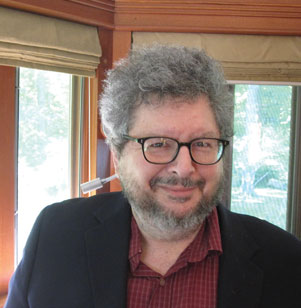Yale Professor: Theory of Evolution Is “Religion” to Most Scholars
By Catherine Elvy, Staff Writer
A renowned Yale University professor is openly questioning academia’s unwavering allegiance to Charles Darwin’s theory of evolution.
David Gelernter recently sparked controversy when the Yale alumnus of 1976 published a candid, favorable review of several books dismantling core aspects of Darwin’s theory. The professor of computer science highlighted gaps in the theory of evolution by natural selection, despite its status within academic circles as the bedrock of science’s modern worldview.
 Yale Professor David GelernterIn a piece entitled Giving Up Darwin, Gelernter queried whether the famed English naturalist’s theory might be wrong. Given the importance of the subject of biological origins, he noted that thoughtful individuals need to weigh available evidence freely.
Yale Professor David GelernterIn a piece entitled Giving Up Darwin, Gelernter queried whether the famed English naturalist’s theory might be wrong. Given the importance of the subject of biological origins, he noted that thoughtful individuals need to weigh available evidence freely.
Gelernter is known for his seminal contributions to parallel computation. The prolific writer and artist is a former national fellow at the American Enterprise Institute and a former senior fellow in Jewish thought at the Shalem Center.
In the spring 2019 issue of the Claremont Review of Books, Gelernter laments how hallowed acceptance of Darwinism serves essentially to certify scholars for devout orthodoxy of prevailing scientific views. Embracing the theory is an “essential first step towards being taken seriously in any part of modern intellectual life,” he wrote.
Recent years of reading and discussion have shifted Gelernter’s perspectives on Darwinism as the cemented explanation for the origin of the species. “It is no victory of any sort for religion. It is a defeat for human ingenuity,” he wrote. “It means one less beautiful idea in our world, and one more hugely difficult and important problem back on mankind’s to-do list.”
While Gelernter continues to regard Darwin’s work as a “brilliant and beautiful scientific theory,” the computer scientist expounded on some of the top reasons why he now believes that evolutionary theory cannot ultimately resolve the origin of mankind and the animal kingdom.
Darwin’s theory assumes that life forms descended from a common ancestor and were influenced by “random, heritable variation and natural selection.” Darwin also conceived such processes as operating blindly over hundreds of millions of years, a prospect that Gelernter finds to be virtually unlikely in terms of mathematics and advances in molecular biology.
“Could nature really have pulled out of its hat the invention of life, of increasingly sophisticated life-forms and, ultimately, the unique-in-the-cosmos (so far as we know) human mind — given no strategy but trial and error?” Gelernter wrote.
While Darwin’s theory can account for small adjustments to local circumstances, it does not appear to explain effectively the emergence of new species; Likewise, the fossils of the Cambrian explosion raise questions about the dearth of predecessor creatures, Gelernter noted.
Evolution proponents describe the origin of species as a bottom-up process that branches into increasingly complex life forms. In 1859, Darwin published his galvanizing literature, fully titled as: On the Origin of species by means of natural selection, or the preservation of favoured races in the struggle for life.
Gelernter wrote Giving Up Darwin, in part, to highlight the insights Cambridge-educated scientist Stephen Meyer articulated in Darwin’s Doubt: The Explosive Origin of Animal Life and the Case for Intelligent Design. Gelernter also reflected upon material from The Deniable Darwin and Other Essays by mathematician David Berlinski (Princeton PhD ’68) and Debating Darwin’s Doubt: A Scientific Controversy that Can No Longer Be Denied, an anthology edited by essayist David Klinghoffer (Brown ’87). The trio of titles “form a fateful battle group that most people would rather ignore,” Gelernter wrote.
In July of 2019, Gelernter joined Meyer and Berlinski in a robust conversation on behalf of Stanford University’s Hoover Institution. During an episode of the online series Uncommon Knowledge, the men discussed the inability of Darwinian evolution to explain the complexity of cells, including the sophistication of DNA coding. Hoover Institution Fellow Peter Robinson (Dartmouth ’79, Stanford MBA ’90) hosted the episode entitled: Mathematical Challenges to Darwin’s Theory of Evolution.
During the program, Gelernter also took time to showcase the mindset of staunch Darwinian academics. The theory of evolution virtually functions as “religion” to scholars, especially within scientific fields.
“As far as they are concerned, take your life in your hands to challenge it intellectually,” Gelernter said during the segment. “They will destroy you if you challenge it.” Such extreme allegiance to evolutionary biology fosters a deficit of free speech within academic communities.
“What I’ve seen, in their behavior intellectually and at colleges across the West, is nothing approaching free speech on this topic,” Gelernter said. “It’s a bitter rejection… It effectively shuts down meaningful scientific intellectual discussion.”
Still, in his essay entitled Giving Up Darwin, Gelernter noted that the famed natural scientist will continue to exert “enormous cultural force.” Nonetheless, the nineteenth-century figure is not in the same scientific orbit with Sir Isaac Newton, one of the world’s most influential physicists, he noted. “Newton’s physics survived Einstein and will always survive, because it explains the cases that dominate all of space-time, except for the extreme ends of the spectrum, at the very smallest and largest scales,” he wrote.
To be sure, Darwin’s signature publication was intellectually daring and even inspiring. “The man will always be admired,” Gelernter wrote. However, when it comes to assessing the origin of biological life, Gelernter questioned how cleanly and quickly scientists can “get over” Darwin’s overly large footprint and move on to new ideas.
“That is one of the most important questions facing science in the twenty-first century,” he said.
Editor's note: This Throwback Thursday article originally appeared in the October 2019 edition of Christian Union: The Magazine.
To stay up to date with important articles like this one and news regarding Christian Union's leadership development efforts at some of our nation's most influential universities, please subscribe to our newsletter: Click here.












